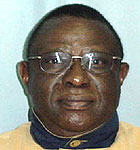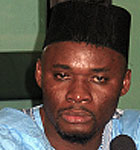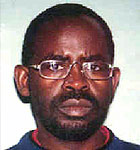Related Research Articles

The International Criminal Tribunal for Rwanda was an international court established in November 1994 by the United Nations Security Council in Resolution 955 in order to judge people responsible for the Rwandan genocide and other serious violations of international law in Rwanda, or by Rwandan citizens in nearby states, between 1 January and 31 December 1994. The court eventually convicted 61 individuals at a cost of $1.3 billion.

Théoneste Bagosora was a Rwandan military officer. He was chiefly known for his key role in the 1994 Rwandan genocide for which he was sentenced to life imprisonment by the International Criminal Tribunal for Rwanda (ICTR). In 2011, the sentence was reduced to 35 years' imprisonment on appeal. He was due to be imprisoned until he was 89. According to René Lemarchand, Bagosora was "the chief organizer of the killings". On 25 September 2021, he died in a prison hospital in Mali, where he was being treated for heart issues.

Radio Télévision Libre des Mille Collines (RTLM) was a Rwandan radio station which broadcast from July 8, 1993 to July 31, 1994. It played a significant role in inciting the Rwandan genocide that took place from April to July 1994, and has been described by some scholars as having been a de facto arm of the Hutu government.

Pauline Nyiramasuhuko is a Rwandan politician who was the Minister for Family Welfare and the Advancement of Women. She was convicted of having incited troops and militia to carry out rape during the Rwandan genocide of 1994. She was tried for genocide and incitement to rape as part of the "Butare Group" at the International Criminal Tribunal for Rwanda (ICTR) in Arusha, Tanzania. In June 2011, she was convicted of seven charges and sentenced to life imprisonment. Nyiramasuhuko is the first woman to be convicted of genocide by the ICTR, and the first woman to be convicted of genocidal rape.
Protais Zigiranyirazo commonly known as Monsieur Zed, is a Rwandan businessman and politician and was governor of the Ruhengeri prefecture in northwestern Rwanda from 1974 to 1989. Accused of war crimes during the Rwandan genocide of 1994, he was ultimately acquitted by the International Criminal Tribunal for Rwanda, after spending six years in prison.
Jean Kambanda is a Rwandan former politician who served as the Prime Minister of Rwanda in the caretaker government from the start of the 1994 Rwandan genocide. He is the only head of government to plead guilty to genocide, in the first group of such convictions since the Convention on the Prevention and Punishment of the Crime of Genocide came into effect in 1951.
Jean-Paul Akayesu is a former teacher, school inspector, and Republican Democratic Movement (MDR) politician from Rwanda, convicted of genocide for his role in inciting the Rwandan genocide.
Léon Mugesera is a convicted genocidaire from Rwanda who took residence in Quebec, Canada. He was deported from Canada for an inflammatory anti-Tutsi speech which his critics allege was a precursor to the 1994 Rwandan genocide. In 2016, he was convicted of incitement to genocide and sentenced to life in prison.
Simon Bikindi was a Rwandan singer-songwriter who was formerly very popular in Rwanda. His patriotic songs were playlist staples on the national radio station Radio Rwanda during the war from October 1990 to July 1994 before the Rwandan Patriotic Front took power. For actions during the Rwandan genocide, he was tried and convicted for incitement to genocide by the International Criminal Tribunal for Rwanda (ICTR) in 2008. He died of diabetes at a Beninese hospital in late 2018.

Hassan Ngeze is a Rwandan journalist and convicted war criminal best known for spreading anti-Tutsi propaganda and Hutu superiority through his newspaper, Kangura, which he founded in 1990. Ngeze was a founding member and leadership figure in the Coalition for the Defence of the Republic (CDR), a Rwandan Hutu Power political party that is known for helping to incite the genocide.
Nyarubuye is a district (akarere) of the East Province in Rwanda. Its area is 439 km², and its population in 2002 was 49,565.
Athanase Seromba is a Catholic priest from Rwanda who was found guilty of committing genocide and of crimes against humanity during the Rwandan genocide.
Augustin Ndindiliyimana is a former Rwandan General and Chief of the Rwandan National Gendarmerie. He was convicted of genocide by the International Criminal Tribunal for Rwanda but he was acquitted by the tribunal upon appeal.

Jean-Bosco Barayagwiza was a convicted Génocidiare and politician associated with the Hutu Power movement. A high-ranking civil servant, Barayagwiza served as policy director within the Ministry of Foreign Affairs at the time of the Rwandan genocide. He has been described as one of the "masterminds" of the genocide.
Ferdinand Nahimana is a Rwandan historian, who was convicted of incitement to genocide for his role in the Rwandan genocide.
Major Bernard Ntuyahaga is a Rwandan army officer convicted by a Belgian court for the murders of ten United Nations peacekeepers at the start of the Rwandan genocide.

Grégoire Ndahimana is the former mayor of Kivumu, Rwanda. Indicted and arrested for alleged war crimes by the International Criminal Tribunal for Rwanda (ICTR), Ndahimana is thought to be one of the key figures in the 1994 Rwandan genocide, and is claimed to have had up to 6,000 Tutsi killed. In 2013, he was convicted of genocide and crimes against humanity and sentenced to 25 years in prison.
Froduald Karamira was a Rwandan politician who was found guilty of crimes in organising the implementation of the 1994 Rwandan genocide. He was sentenced to death by a Rwandan court and was one of the last 22 individuals executed by Rwanda.
Emmanuel Rukundo is a Rwandan Roman Catholic priest who in 2009 was convicted of genocide and crimes against humanity by the International Criminal Tribunal for Rwanda (ICTR) for his participation in the 1994 Rwandan Genocide.
Hate media is a form of violence, which helps demonize and stigmatize people that belong to different groups. This type of media has had an influential role in the incitement of genocide, with its most infamous cases perhaps being Radio Televizija Srbije during wars in Yugoslavia, Radio Télévision Libre des Milles Collines (RTLM) during the Rwandan genocide and Nazi Germany’s Der Stürmer.
References
- ICTR: Jean de Dieu Kamuhanda, former minister, hirondelle.org, accessed 2009-03-05
- "Trial Watch: Jean de Dieu Kamuhanda", trial-ch.org, accessed 2009-03-05